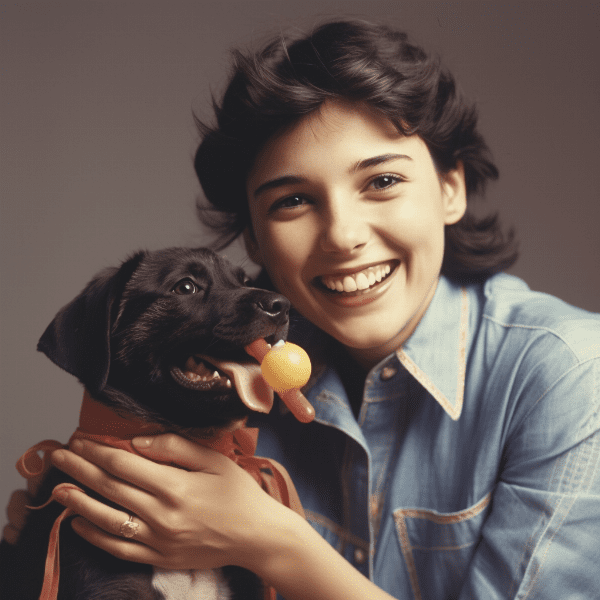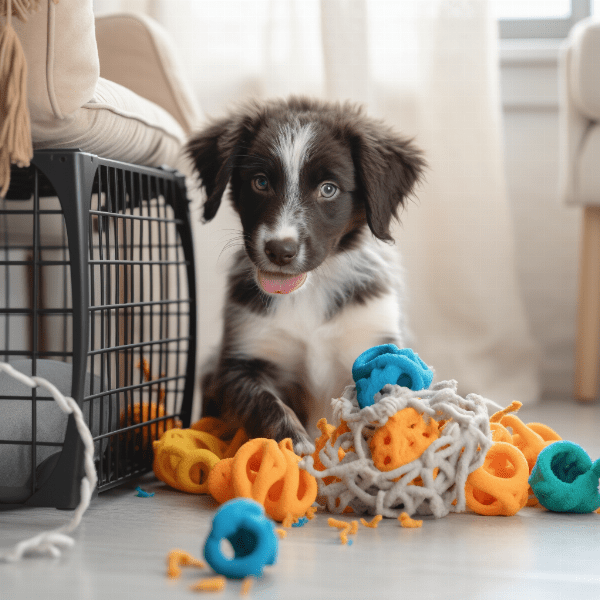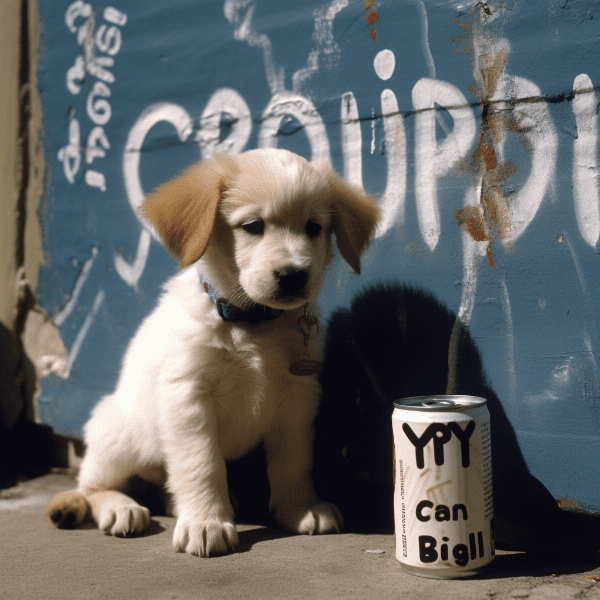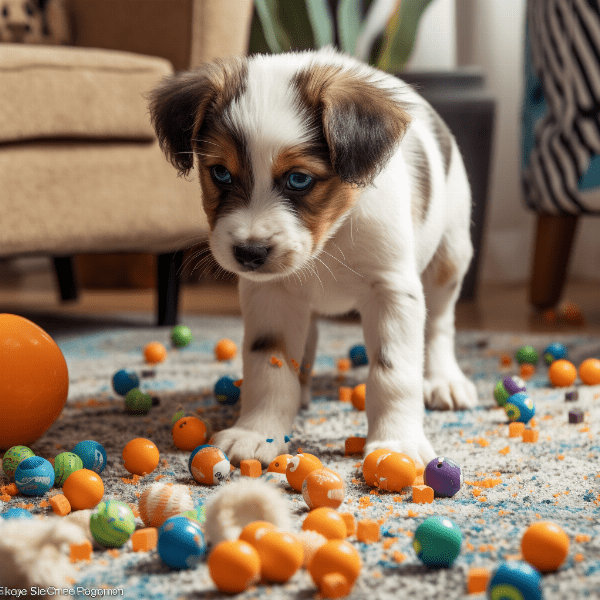Table of Contents
- Why Do Puppies Chew Shoes?
- Understanding Your Puppy’s Behavior
- Setting Boundaries: Training Your Puppy
- Positive Reinforcement Techniques
- Distracting Your Puppy from Chewing
- Using Chew Toys to Redirect Behavior
- Managing Your Home Environment
- Consistency is Key
- Dealing with Setbacks and Challenges
- Celebrating Your Puppy’s Progress
Why Do Puppies Chew Shoes?
Puppies are known for their playful and curious nature, which can often result in them chewing on things they shouldn’t. This behavior is perfectly normal and is a natural part of a puppy’s development, but it can be frustrating for pet owners when their puppies start chewing on their shoes. Understanding why puppies chew shoes is the first step towards stopping this behavior.
The Teething Stage
Puppies, like human babies, go through a teething stage where their teeth are coming in, and their gums are sore. During this time, puppies may chew on things to alleviate the discomfort in their gums. Shoes are a common target for puppies because they offer a good texture for chewing and have a satisfying smell.
Boredom and Anxiety
Puppies are energetic creatures that need plenty of physical and mental stimulation to keep them happy and healthy. When they don’t receive enough exercise or attention, they may resort to chewing on things to relieve their boredom or anxiety. Shoes, with their interesting textures and smells, can be an easy target for a bored or anxious puppy.
Exploration and Curiosity
Puppies are naturally curious and enjoy exploring their environment. Chewing on shoes can be a way for them to investigate new objects and textures. It’s important to remember that puppies don’t have the same understanding of what is valuable or off-limits as humans do, and they may not understand that shoes are not meant to be chewed on.
Lack of Training
Finally, puppies may chew on shoes simply because they haven’t been trained not to. As pet owners, it’s our responsibility to teach our puppies what is and isn’t acceptable behavior. Without proper training, puppies may not understand that chewing on shoes is not allowed.
Understanding why puppies chew on shoes can help us develop a plan to stop this behavior. By addressing the root cause of the behavior and providing appropriate training and distraction techniques, we can teach our puppies to chew on appropriate items and avoid destructive chewing behaviors.
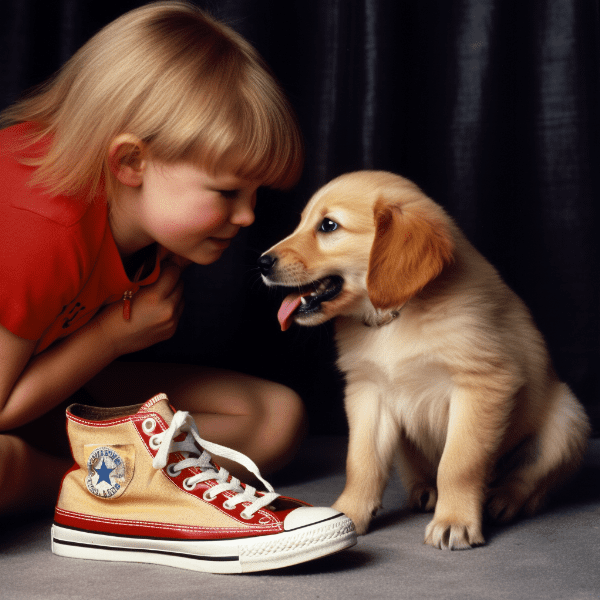
Understanding Your Puppy’s Behavior
As a pet owner, it’s important to understand your puppy’s behavior and the reasons behind it. By understanding why your puppy chews on shoes, you can develop an effective plan to stop this behavior.
Observing Your Puppy’s Behavior
The first step in understanding your puppy’s behavior is to observe them in different situations. Watch your puppy closely and take note of when they are most likely to chew on shoes. Is it when they are bored, anxious, or teething? Is there a specific time of day when they are more likely to chew? By understanding the triggers for the behavior, you can address the root cause and provide appropriate training.
Body Language
Puppies communicate their emotions through their body language. Understanding your puppy’s body language can help you recognize when they are feeling bored, anxious, or stressed. Signs of anxiety may include trembling, panting, and pacing, while signs of boredom may include restlessness and lack of interest in their surroundings. By recognizing these signs, you can take steps to alleviate your puppy’s anxiety or boredom and redirect their attention away from chewing on shoes.
Consistency
Consistency is key when it comes to training your puppy. Make sure everyone in the household is on the same page when it comes to rules and boundaries for your puppy. If your puppy is not allowed to chew on shoes, make sure everyone is enforcing this rule consistently.
By understanding your puppy’s behavior and providing appropriate training and positive reinforcement, you can help them develop good habits and avoid destructive chewing behaviors. Remember to be patient and consistent, and always provide your puppy with appropriate alternatives to chew on.
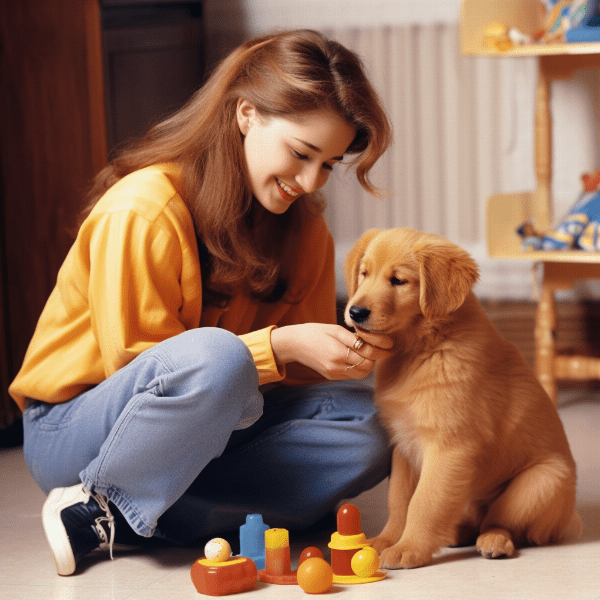
Setting Boundaries: Training Your Puppy
Training your puppy to understand what is and isn’t allowed is an important step in stopping them from chewing on shoes. Here are some tips for setting boundaries and training your puppy:
Establishing Rules and Boundaries
The first step in training your puppy is to establish clear rules and boundaries. Make it clear to your puppy that chewing on shoes is not allowed. Provide appropriate toys for your puppy to chew on and praise them when they use these toys instead of shoes. Consistency is key when establishing rules and boundaries, so make sure everyone in the household is on board with the rules.
Redirecting Your Puppy’s Attention
If you catch your Puppy chewing on shoes, redirect their attention to an appropriate toy. Say “no” firmly but calmly, and then offer them a toy that they are allowed to chew on. Praise them when they start chewing on the appropriate toy.
Crating Your Puppy
When you’re unable to supervise your puppy, it’s a good idea to crate them to prevent them from chewing on shoes or other inappropriate objects. Make sure the crate is comfortable and provide your puppy with plenty of toys and treats to keep them occupied.
Seeking Professional Help
If your puppy’s chewing behavior persists despite your best efforts, it may be time to seek professional help. A professional dog trainer or veterinarian can provide additional guidance and support in stopping destructive chewing behaviors.
By setting clear rules and boundaries, using positive reinforcement, and redirecting your puppy’s attention, you can train your puppy to stop chewing on shoes. Remember to be patient and consistent, and always provide your puppy with appropriate alternatives to chew on.
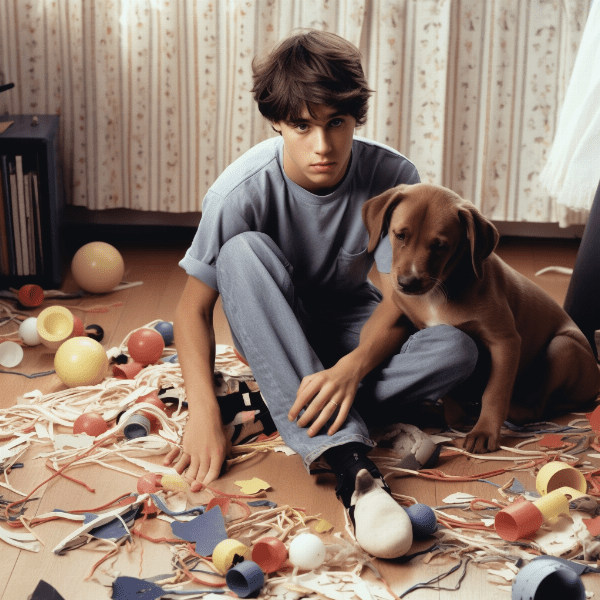
Positive Reinforcement Techniques
Positive reinforcement is a powerful tool in stopping your puppy from chewing on shoes. Here are some positive reinforcement techniques that you can use to encourage your puppy to chew on appropriate toys:
Treats and Praise
Offering treats and praise is one of the most effective ways to reinforce good behavior in your puppy. When you catch your puppy chewing on an appropriate toy, offer them a treat and praise them with a positive tone of voice. This reinforces the behavior and encourages your puppy to continue chewing on appropriate toys.
Playtime
Playtime is an important part of your puppy’s development and can be used as a positive reinforcement technique. When your puppy chews on appropriate toys, engage them in playtime. This can include playing fetch or tug-of-war, or simply spending time petting and cuddling with your puppy. By associating appropriate chewing behavior with fun and positive experiences, you can encourage your puppy to continue this behavior.
Clicker Training
Clicker training is a positive reinforcement technique that uses a clicking sound to mark good behavior. When your puppy chews on an appropriate toy, click the clicker and offer them a treat. This reinforces the behavior and helps your puppy understand which behaviors are desirable.
Consistency
Consistency is key when it comes to positive reinforcement techniques. Make sure everyone in the household is on board with the positive reinforcement techniques you’re using, and be consistent in your approach. This reinforces the behavior and helps your puppy understand what is expected of them.
Avoiding Punishment
It’s important to avoid punishment-based training methods, as these can lead to fear and anxiety in your puppy. Instead, focus on positive reinforcement techniques that encourage good behavior. When your puppy chews on inappropriate objects, simply redirect their attention to an appropriate toy and offer praise and treats when they start chewing on the appropriate toy.
Positive reinforcement techniques can be a powerful tool in stopping your puppy from chewing on shoes. By using treats and praise, playtime, clicker training, and consistency, you can encourage your puppy to chew on appropriate toys and avoid destructive chewing behaviors.
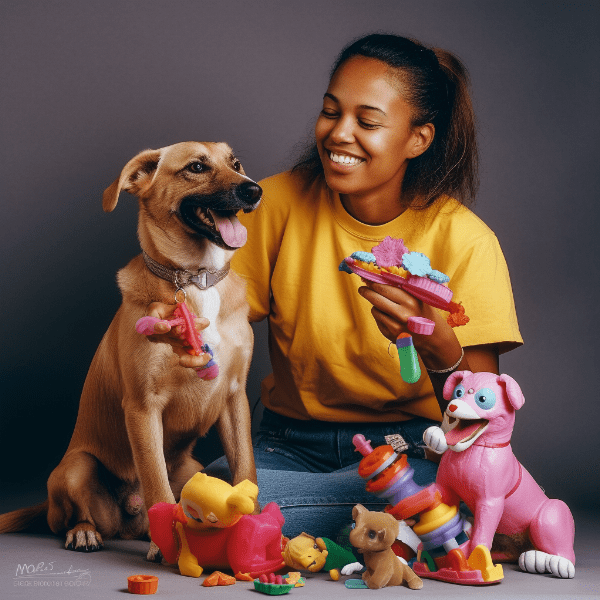
Distracting Your Puppy from Chewing
When your puppy is chewing on shoes, it can be helpful to distract them with alternative activities. Here are some tips for distracting your puppy from chewing on shoes:
Interactive Toys
Interactive toys, such as puzzle toys or treat-dispensing toys, can be a great way to distract your puppy from chewing on shoes. These toys provide mental stimulation and can keep your puppy occupied for extended periods of time. Make sure to supervise your puppy when they’re playing with these toys to ensure their safety.
Exercise
Providing your puppy with plenty of exercise can help alleviate boredom and reduce their desire to chew on shoes. Take your puppy for walks or play fetch with them in the yard. A tired puppy is less likely to engage in destructive behaviors.
Training and Socialization
Training and socialization are important parts of your puppy’s development and can help reduce their desire to chew on shoes. Enroll your puppy in obedience classes or hire a professional trainer to work with them. Socialize your puppy with other dogs and people to help reduce their anxiety and boredom.
Environmental Enrichment
Providing your puppy with a stimulating environment can help reduce their desire to chew on shoes. Rotate your puppy’s toys regularly to keep them interested, and provide them with plenty of safe objects to chew on, such as rawhide chews or bones.
Supervision
When all else fails, supervision is key. Keep an eye on your puppy and intervene if you catch them chewing on shoes. Redirect their attention to an appropriate toy and offer plenty of positive reinforcement when they start chewing on the appropriate toy.
By distracting your puppy from chewing on shoes and providing alternative activities, you can reduce their desire to engage in destructive behaviors. Remember to always supervise your puppy and offer plenty of positive reinforcement for good behavior.
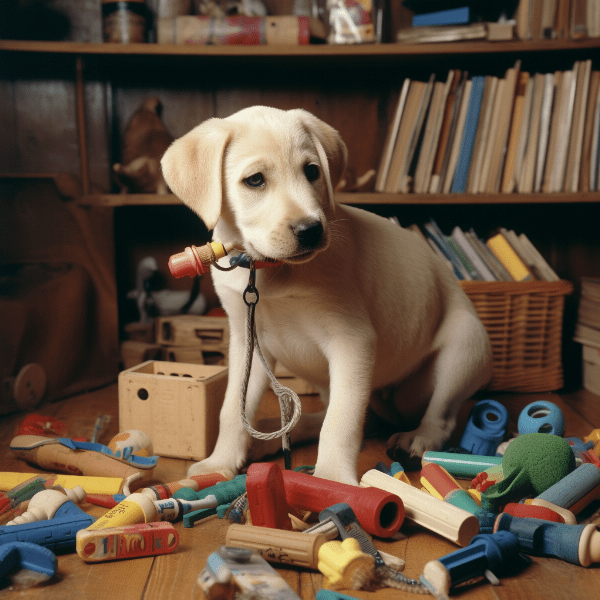
Using Chew Toys to Redirect Behavior
Chew toys can be a great tool for redirecting your puppy’s chewing behavior onto appropriate items. Here are some tips for using chew toys to redirect your puppy’s behavior:
Choose the Right Toys
Choosing the right chew toys is important to ensure your puppy is interested in them. Look for toys that are appropriate for your puppy’s age, size, and chewing habits. Toys that are too small or too large can be dangerous, so make sure to choose toys that are appropriate for your puppy’s size.
Variety
Offering a variety of chew toys can keep your puppy interested and prevent them from becoming bored with their toys. Rotate your puppy’s toys regularly to keep them interested, and make sure to offer toys with different textures and shapes.
Size and Texture
Puppies have different preferences when it comes to the size and texture of their toys. Some puppies prefer softer toys, while others prefer harder toys. Offer a variety of toys with different textures and see which ones your puppy prefers.
Supervision
It’s important to supervise your puppy when they’re playing with chew toys to ensure their safety. Some toys may break or become damaged, and pieces can be swallowed, leading to choking or other health problems.
Positive Reinforcement
When your puppy chews on appropriate toys, offer plenty of positive reinforcement. Praise your puppy with a positive tone of voice, and offer treats or playtime as a reward. This reinforces the behavior and encourages your puppy to continue chewing on appropriate toys.
By providing your puppy with appropriate chew toys and offering positive reinforcement for good behavior, you can redirect their chewing behavior onto appropriate items. Remember to supervise your puppy when they’re playing with toys and offer a variety of toys with different textures and shapes.

Managing Your Home Environment
Managing your home environment is an important part of stopping your puppy from chewing on shoes. Here are some tips for managing your home environment to prevent destructive chewing behaviors:
Store Shoes Away
One of the easiest ways to prevent your puppy from chewing on shoes is to simply store them out of reach. Keep your shoes in a closet or other area that your puppy cannot access. Make sure to keep the closet door closed or use a baby gate to block off the area.
Pick Up Objects
Puppies are curious and will chew on anything they can get their paws on. Pick up objects around your home that your puppy may be tempted to chew on. This includes items such as books, cords, and children’s toys.
Block Off Restricted Areas
If there are areas of your home that you don’t want your puppy to access, use baby gates or other barriers to block them off. This can prevent your puppy from accessing shoes or other objects that they may be tempted to chew on.
Use Bitter Apple Spray
Bitter apple spray is a safe and effective deterrent for puppies who like to chew on objects they shouldn’t. Spray a small amount of the bitter apple spray on your shoes or other objects your puppy is tempted to chew on. The sour taste will discourage your puppy from chewing on these objects.
Provide Plenty of Toys
Providing your puppy with plenty of appropriate toys to chew on can help prevent destructive chewing behaviors. Make sure to offer a variety of toys with different textures and shapes, and rotate the toys regularly to keep your puppy interested.
By managing your home environment and providing your puppy with appropriate toys, you can prevent destructive chewing behaviors. Remember to store shoes out of reach, pick up objects, block off restricted areas, use bitter apple spray, and offer plenty of appropriate toys.
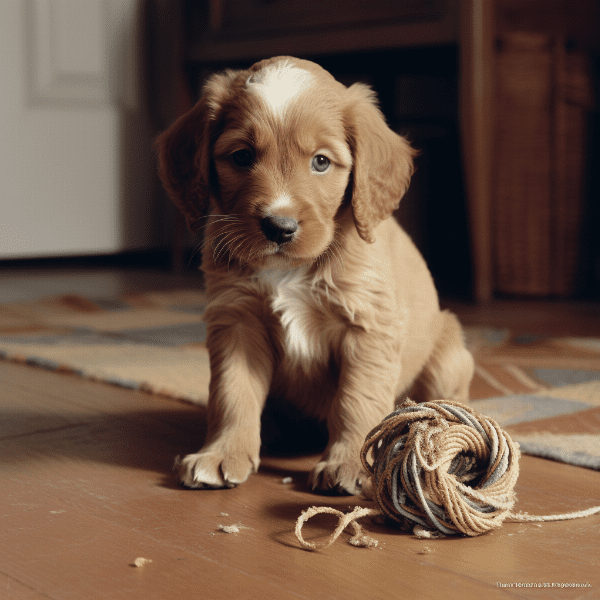
Consistency is Key
Consistency is a critical component of stopping your puppy from chewing on shoes. Here are some tips for being consistent in your training:
Establish Clear Rules
Establishing clear rules and boundaries is the first step in being consistent with your puppy’s training. Make sure everyone in the household is on board with the rules, and be consistent in enforcing them.
Avoid Punishment-Based Training
Punishment-based training methods can lead to fear and anxiety in your puppy. Instead, focus on positive reinforcement techniques to encourage good behavior.
Stick to a Routine
Sticking to a routine can help your puppy develop good habits and avoid destructive chewing behaviors. Make sure to feed your puppy at the same time each day, and provide them with plenty of exercise and playtime.
.
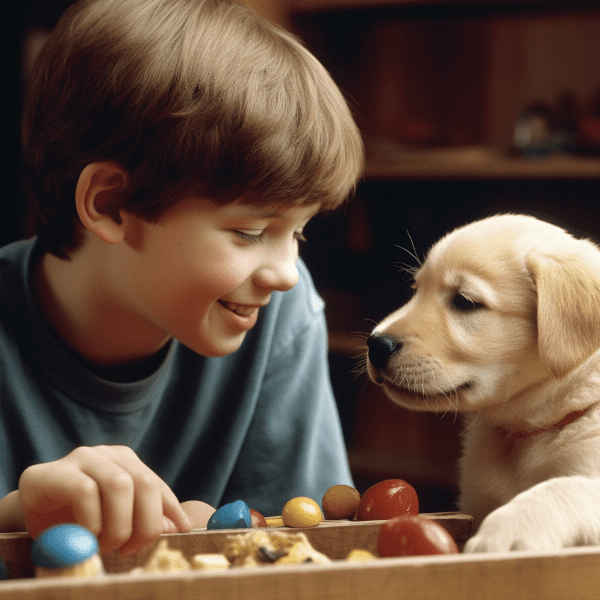
Dealing with Setbacks and Challenges
Stopping your puppy from chewing on shoes can be a challenging process, and setbacks are bound to happen. Here are some tips for dealing with setbacks and challenges:
Identify the Cause
When your puppy exhibits destructive chewing behavior, try to identify the cause. Are they bored or anxious? Are they teething? Identifying the cause can help you address the underlying issue and prevent further destructive behaviors.
Reevaluate Your Training Approach
If your current training approach isn’t working, it may be time to reevaluate your approach. Consider seeking the help of a professional dog trainer or veterinarian who can provide additional guidance and support.
Offer More Exercise and Playtime
Puppies who are bored or restless are more likely to exhibit destructive behaviors, including chewing on shoes. Offer your puppy plenty of exercise and playtime to alleviate boredom and reduce destructive behaviors.
Use Deterrents
Deterrents, such as bitter apple spray or other taste deterrents, can be an effective tool for stopping destructive chewing behaviors. If your puppy continues to chew on shoes despite your best efforts, try using a deterrent to discourage them from engaging in this behavior.
.
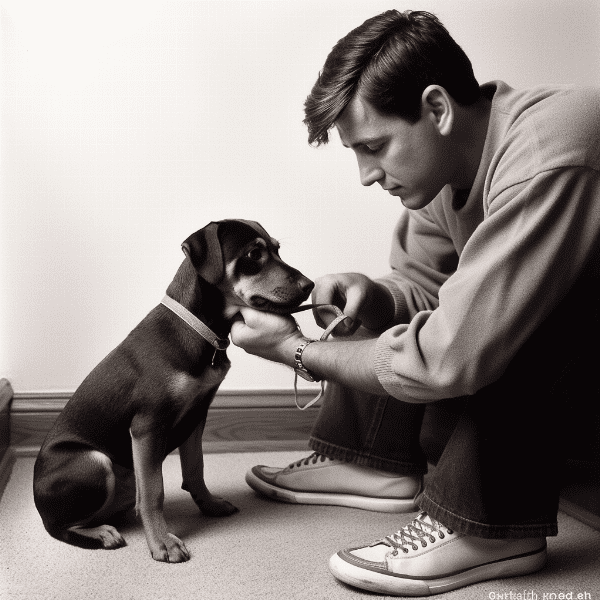
Celebrating Your Puppy’s Progress
As you work to stop your puppy from chewing on shoes, it’s important to celebrate their progress and achievements. Here are some tips for celebrating your puppy’s progress:
Offer Praise and Treats
When your puppy exhibits good behavior, such as chewing on appropriate toys, offer plenty of praise and positive reinforcement. This reinforces the behavior and encourages your puppy to continue exhibiting good behavior.
Set Achievable Goals
Setting achievable goals can help you track your puppy’s progress and celebrate their achievements. For example, set a goal of going one week without your puppy chewing on shoes. When your puppy achieves this goal, celebrate their progress with plenty of praise and treats.
Reward with Fun Activities
Rewarding your puppy’s progress with fun activities can be a great way to celebrate their achievements. Take your puppy to the park, play fetch with them, or spend time cuddling with them. By associating good behavior with fun activities, you can encourage your puppy to continue exhibiting good behavior.
Track Progress
Tracking your puppy’s progress can help you see how far they’ve come in their training. Keep a journal or use a training app to track your puppy’s progress, and celebrate each milestone they achieve.
Be Patient
Remember to be patient with your puppy as they learn and grow. Celebrating their progress, no matter how small, can help reinforce good behavior and encourage them to continue making progress.
By offering praise and treats, setting achievable goals, rewarding with fun activities, tracking progress, and being patient, you can celebrate your puppy’s progress in stopping destructive chewing behaviors. Remember to stay consistent in your approach and celebrate each milestone your puppy achieves.
